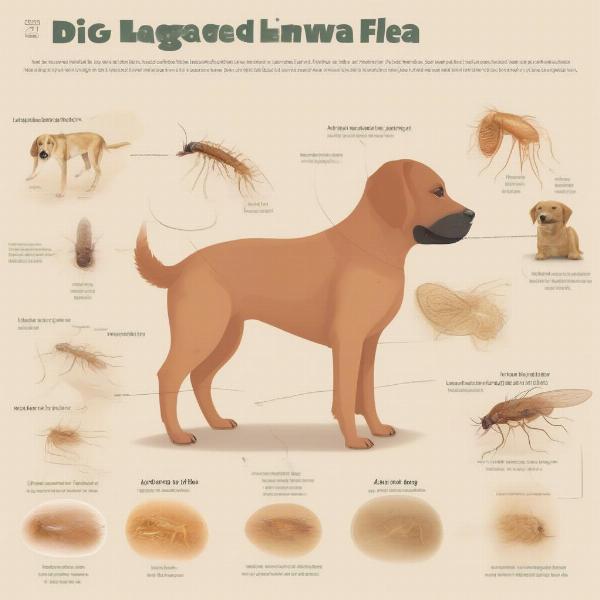Fleas are a common nuisance for dogs, causing itching, irritation, and even health problems. Choosing the right flea deterrent for dogs is crucial for protecting your furry friend. This guide will explore various flea prevention methods, from natural remedies to vet-prescribed medications, helping you make informed decisions for your dog’s well-being.
Understanding Flea Deterrents for Dogs
Before diving into the specifics, it’s important to understand what flea deterrents are and how they work. Flea deterrents encompass a broad range of products designed to repel or kill fleas. They can be topical, oral, or environmental, each with its own mechanism of action. Some deterrents kill adult fleas, while others interrupt the flea life cycle by preventing eggs and larvae from developing. Choosing the most effective flea deterrent depends on your dog’s lifestyle, health, and the severity of the infestation.
 Flea Lifecycle on a Dog
Flea Lifecycle on a Dog
Types of Flea Deterrents
There are several types of flea deterrents available, each with its pros and cons:
- Topical Treatments: These are applied directly to your dog’s skin, usually on the back of the neck. They work by spreading through the skin and killing fleas on contact. Some popular topical treatments include fipronil, imidacloprid, and selamectin.
- Oral Medications: These are pills or chewable tablets that kill fleas when they bite your dog. They are generally safe and effective, but some dogs may experience side effects like vomiting or diarrhea. Common oral flea medications include spinosad, afoxolaner, and fluralaner.
- Flea Collars: These collars release insecticide over time, killing fleas that come into contact with your dog’s fur. Some collars are also waterproof, making them suitable for dogs that swim frequently. However, some dogs may develop skin irritation around the collar area.
- Natural Flea Deterrents: These include essential oils like lavender, cedarwood, and peppermint, as well as diatomaceous earth. While some natural remedies may offer some repellent properties, they are generally not as effective as chemical treatments.
Choosing the Right Flea Deterrent
When choosing a flea deterrent, consider the following factors:
- Your Dog’s Age and Health: Puppies and senior dogs, as well as dogs with certain health conditions, may require specialized flea treatments. Always consult your vet before using any flea product on a puppy, pregnant or nursing dog, or a dog with health issues.
- Lifestyle: Does your dog swim frequently? Spend a lot of time outdoors? These factors will influence the type of flea deterrent that is most suitable.
- Severity of Infestation: For severe infestations, a combination of treatments may be necessary. Your vet can recommend the best approach.
Preventing Flea Infestations
While flea deterrents are essential, preventing infestations in the first place is the best approach. Here are some preventive measures:
- Regular Grooming: Brush your dog regularly to remove fleas and flea dirt.
- Frequent Vacuuming: Vacuum your home thoroughly, paying special attention to areas where your dog spends the most time.
- Washing Bedding: Wash your dog’s bedding regularly in hot water.
- Yard Treatment: Treat your yard with a flea and tick spray or granules.
How to Apply Flea Deterrents
Always follow the manufacturer’s instructions carefully when applying any flea deterrent. For topical treatments, part your dog’s fur at the base of the neck and apply the solution directly to the skin. For oral medications, follow the dosage instructions based on your dog’s weight.
Conclusion
Choosing the right flea deterrent for dogs is a crucial part of responsible pet ownership. By understanding the different types of deterrents available and taking preventive measures, you can keep your dog happy, healthy, and flea-free. Remember to consult your vet for personalized recommendations and guidance.
FAQ
- What is the best flea deterrent for dogs? The best flea deterrent depends on your dog’s individual needs. Consult your vet for personalized advice.
- Are natural flea deterrents effective? While some natural remedies may offer some repellent properties, they are generally not as effective as chemical treatments.
- How often should I apply flea treatment to my dog? Follow the manufacturer’s instructions or consult your vet.
- Can I use cat flea treatment on my dog? No, never use cat flea treatment on a dog, as it can be toxic.
- What should I do if my dog has a severe flea infestation? Consult your vet immediately for a tailored treatment plan.
- Can fleas transmit diseases to dogs? Yes, fleas can transmit diseases like tapeworms and Bartonellosis.
- How can I prevent fleas in my home? Regular vacuuming, washing bedding, and yard treatment can help prevent flea infestations.
Related Articles:
About ILM Dog:
ILM Dog is your trusted source for expert advice on dog care and wellbeing. We offer comprehensive information on various aspects of dog ownership, including breed selection, health care, training, nutrition, grooming, and much more. We are dedicated to providing practical, evidence-based information to help you provide the best possible care for your furry companion. Contact us for further inquiries via email at [email protected] or call us at +44 20-3965-8624.